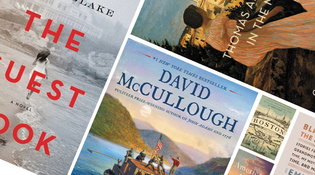 loading
loading
Arts & CultureOutputTo have your book, CD, app, or other work considered for Output, please send a copy to Arts Editor, Yale Alumni Magazine, PO Box 1905, New Haven CT 06509; or e-mail a copy or link to [email protected].  View full imageThe City-State of Boston: The Rise and Fall of an Atlantic Power, 1630–1865 There are three well-known notes in the “major chord” of Boston’s history: its “city upon a hill” Puritan founding in 1630, its first rebellion against English rule in 1689, and its 1775 role in the American Revolution. But there’s a jarring fourth note that forms the heart of this authoritative look at Boston’s “hidden history.” In 1854, the city, occupied again by federal troops, sent escaped slave Anthony Burns back into bondage. It was a complicity, argues Peterson, inherent in the fact that Boston was built in part through slavery.
American Eden: David Hosack, Botany, and Medicine in the Garden of the Early Republic Although “Hosack’s name has largely been forgotten,” writes Johnson, he was a pioneering botanist and physician, best known as the attending doctor during the Burr-Hamilton duel. He was also the “original urban gardener,” who channeled his passions for medicine and nature into the creation of the Elgin Botanic Garden: the first research facility of its kind in the young nation, and one of many New York institutions Hosack built to improve the health of the city and the country.
Thomas and Beal in the Midi: A Novel In this beautifully crafted novel, Thomas Bayly, the white and unsuccessful son of a Maryland farmer, and Beal Terrell, an African American farm worker, marry—but it’s 1892, and they have to flee their home for a more welcoming place. The couple chooses Belle Époque Paris. Surrounded by other expats, many of them struggling artists, they buy a vineyard in the south of France. “It’s your chance to succeed where your father failed,” Thomas is told. Therein hangs a four-decade tale of luck, grace, courage, and love.
The Pioneers: The Heroic Story of the Settlers Who Brought the American Ideal West The 1783 Paris treaty that ended the Revolutionary War gave the fledgling US government “the Ohio country”—more than a quarter-million square miles of “howling wilderness” that would eventually become Ohio, Indiana, Illinois, Michigan, and Wisconsin. To settle this vast area, Massachusetts pastor and polymath Manasseh Cutler, Class of 1765, and a band of associates hatched a plan in 1786 at Boston’s Bunch of Grapes tavern. Pulitzer Prize winner McCullough explores how Reverend Cutler and company “change[d] the course of history.”
Black Is the Body: Stories from My Grandmother’s Time, My Mother’s Time, and Mine The horrific headline of the New Haven Register on August 8, 1994, read “Stabbing Spree Sends 7 to Hospitals.” One of those seven was the author. In her lead essay, Bernard writes: “Revisiting that wound has been a way of putting myself back together.” Each of the dozen tales about her past in this book adds to an elegant, intertwining memoir and a lesson about black lives and healing. “In every scar there is a story,” she writes. “The salve is the telling itself.”
The Guest Book Before the one percent were called the one percent, they were, at least in their own minds, the best and brightest, destined to run the nation and affect history, in no small part because they already were. Sarah Blake’s ambitious The Guest Book explores one such family, and their multiple, often dark secrets, over three generations on a beloved island in Maine. Having been raised to do and be good, the characters “mean well” and yet are (often unintentionally) anti-Semitic, racist, even complicit with evil. In every generation, Jewish and black characters press against the Miltons’ sense of the world. In the present, diminishing funds and new priorities leave the novel’s ultimate heroine—a liberal historian named Evie—unsure of how to balance her values with her affection for an island so tied to her heritage.
The comment period has expired.
|
|